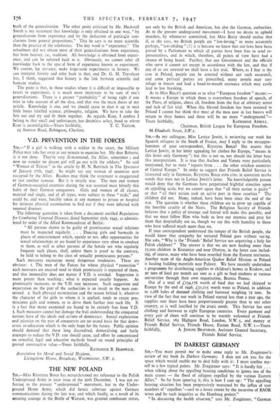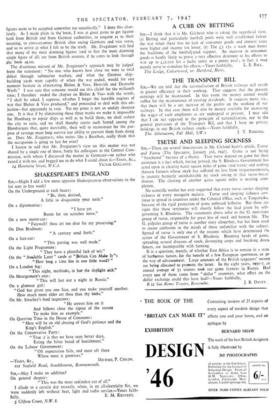IN DARKEST GERMANY
SIR,—You must permit me' to make some reply to Mr. Zvegintzov's• review of my book In Darkest Germany. I dare not ask you for the space which would enable me to deal fully with it: I must confine my- self to a few typical points. Mr. Zvegintzov says: "It is hardly fair . . . when talking about the appalling housing conditions to ignore one of the main causes — the flood of refugees expelled by the various Eastern Allies." So far from ignoring it, this is how I sum up: "The appalling housing situation has been progressively worsened by the influx of vast numbers of 'expellees '—and to a lesser extent by the incursion of BAOR wives and by such iniquities as the Hamburg project."
"In discussing the health situation," says Mr. Zvegintzov. "German
figures seem to be accepted somewhat too uncritically." I deny this abso- lutely. As I made plain in the' book, I was at great pains to get figures both from British and from German authorities, to enquire as to their meaning, to cross-examine British after seeing Germans and vice versa, and so to arrive at what I felt to be the truth. Mr. Zvegintzov will find that many of my most damning figures (and in fact the most damning single figure of all) are from British sources, if he cares to look through ahe book again.
The disastrous naivete of Mr. Zvegintzov's approach may be judged from the statement: "No one who knows how close we were to total defeat through submarine warfare, and what the German ship- building yards were capable of when the war ended, would for one moment hesitate in eliminating Blohm & Voss, Howaldt and Deutsche Werft." I was sure that someone would use this cliché for the millionth time; I therefore ended the chapter on Blohm & Voss with the words, "I shall be asked. I suppose, wl-ether I forget the horrible engines of war that Blohm & Voss produced," and proceeded to deal with this ob- jection—but apparently in vain. Yet my point is not an unduly abstruse one. It is that if by eliminating these three works we make it impossible for Hamburg to repair ships as well as to build them, we shall reduce the city to ruin; and we shall thereby create such hatred among the Hamburgers that, quite inevitably, their will to reconstruct for the pur- pose of revenge must long survive our ability to prevent them from doing so. Does Mr. Zvegintzov, who writes like a Bourbon, really think that the occupation is going to last for ever?
I hasten to add that Mr. Zvegintzov's view on this matter was not shared by a single one of those, lately his colleagues in the Control Com- mission, with whom I discussed the matter in Germany—or rather who raised it with me, and begged me to do what I could about it.—Yours, &c.,



































 Previous page
Previous page